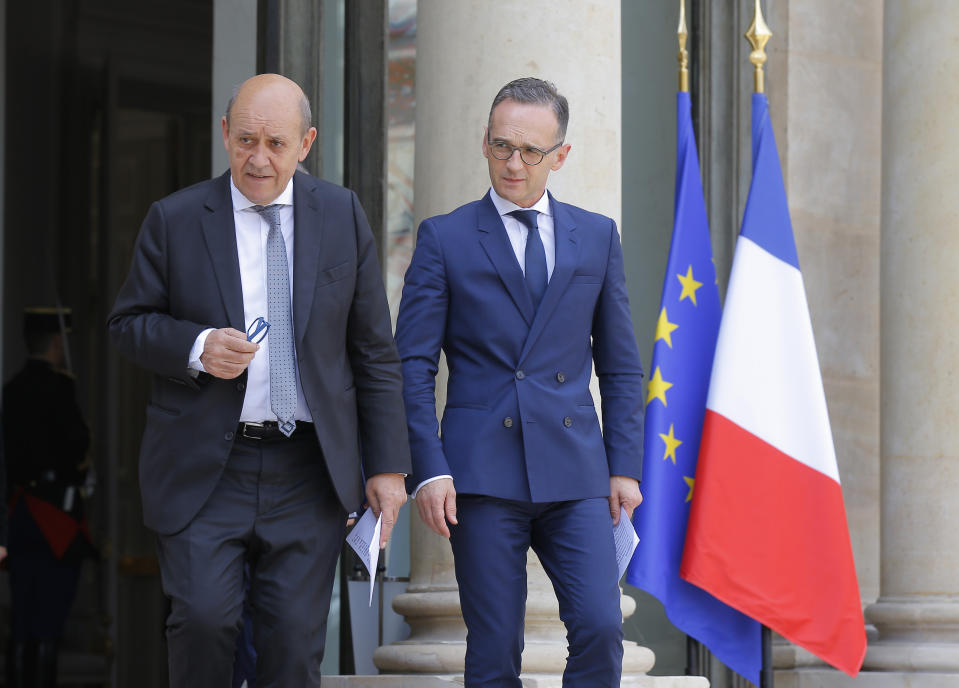Europeans cool on Iran coalition talk, seek de-escalation
BERLIN (AP) — European officials on Monday appeared cool toward U.S. talk of building a global coalition against Iran, with the German foreign minister warning that "maximum pressure" without diplomacy increases the risks of a war and several others stressing that their priority is to de-escalate tensions in the Middle East.
The split over Iran comes amid deepening divisions between the United States and Europe over foreign policy and trade, with the allies appearing to talk past each other on a matter that both view as a crucial security issue.
U.S. Secretary of State Mike Pompeo, visiting Middle Eastern allies Saudi Arabia and the United Arab Emirates, said he would discuss "how we can build out a global coalition" against Tehran that also includes countries in Asia and Europe, describing Iran as "the world's largest state sponsor of terror."
German Foreign Ministry spokesman Christofer Burger said Berlin had "taken note via the media" of Pompeo's comments on a coalition, a formulation that indicated his country had yet to be asked to join directly. He added that "our top aim is and remains a de-escalation of the serious situation," pointing to contacts at various levels with the U.S. and noting that various representatives of the three European countries have recently been in Tehran.
Germany, France and Britain, along with Russia and China, remain part of the nuclear deal that U.S. President Donald Trump's administration abandoned last year. The 2015 agreement aimed at curbing Iran's nuclear ambitions in exchange for relief from economic sanctions.
Germany argues that the agreement, beyond ensuring that Iran doesn't produce nuclear weapons, also helps keep open lines of communication with Tehran to address other concerns about its behavior in the Middle East.
On Sunday, German Foreign Minister Heiko Maas doubled down on criticism of the Trump administration's strategy of "maximum pressure" against Tehran, which is weighing heavily on Iran's economy.
"The strategy of maximum pressure can't be the right one, because one of the consequences is that we are all talking about how serious the situation is, and that there is a danger of war," he told ZDF television.
"This is the time for diplomacy," he added. "We have to ensure that these tensions are reduced, because otherwise any event — without it being clear who caused it — could lead to ... a spiral of violence that ends in a war."
The point was echoed by the spokeswoman for European Union foreign policy chief Federica Mogherini, one of the guarantors of the 2015 agreement.
Asked about the U.S. call for a coalition against Iran, spokeswoman Maja Kocijancic said that "exclusively diplomatic routes are needed to resolve differences. The EU is ready to work with partners to take this forward."
She added that "the latest developments underline the urgent need for restraint, for open channels of dialogue and for immediate de-escalation."
Maas recently traveled to Tehran, Britain sent a Foreign Office minister there and France sent President Emmanuel Macron's chief diplomatic adviser.
Speaking on the sidelines of a Mediterranean summit in Marseille, Macron urged that diplomacy prevail.
The leaders of the three European countries will have a chance to discuss Iran directly with Trump at the Group of 20 summit in Japan that starts Friday, and Macron said he would take that opportunity to do so.
"We must find a constructive solution with one objective, which is the collective security of the region," he said.
British Foreign Secretary Jeremy Hunt, who is also campaigning to lead the Conservative Party and become the new prime minister, told the Daily Mail newspaper over the weekend that "we will stand by the United States as our strongest ally, but of course we have to consider any requests for military support on a case-by-case basis."
He said that "we want to de-escalate the situation but we are of course extremely worried."
Macron's office hasn't commented on the outcome of the presidential adviser's visit to Iran. On Friday, Macron said that he was "calling on all parties to be reasonable and keep talking."
On Monday, Brian Hook, the U.S. special envoy for Iran, said Washington wants partners to join forces to increase maritime security in the Persian Gulf. He said one option could be to "enhance" an existing multinational maritime force in the region involving about 30 countries — several of them in Europe — that fights drug and arms smuggling.
The Europeans' diplomatic balancing act faces severe pressure from the Iranian side as well. On Friday, officials from Iran and the remaining parties to the nuclear deal are due to hold a regular meeting in Vienna, with Tehran saying that it expects to exceed the uranium stockpile limit set by the agreement this week.
Iran also has set a July 7 deadline for Europe to come up with better terms for it to stay in the accord. If that deadline passes without any action, President Hassan Rouhani has said the Islamic Republic likely will resume higher uranium enrichment. The Europeans are trying to implement a complicated barter-type system known as INSTEX to keep up trade with Iran.
The Europeans are insisting Iran stick to its obligations under the deal in full, with German Chancellor Angela Merkel saying that if Tehran doesn't abide by the accord, "that will of course have consequences." Officials won't elaborate on what exactly would happen.
___
Associated Press writers Frank Jordans in Berlin, Lorne Cook in Brussels, Danica Kirka in London and Sylvie Corbet, Elaine Ganley and Angela Charlton in Paris contributed.




